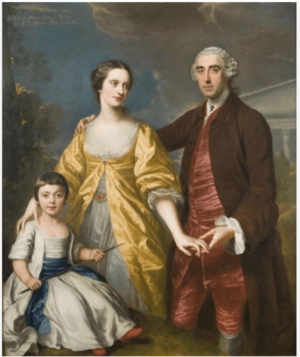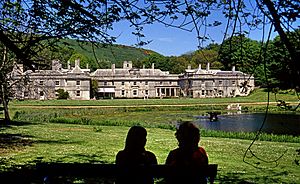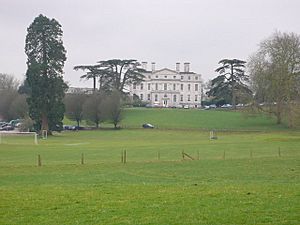John Pitt (of Encombe) facts for kids
Quick facts for kids
John Pitt
|
|
|---|---|

Portrait of John Pitt by William Hoare
|
|
| Born | c. 1704 |
| Died | 1787 |
| Alma mater | Queen's College, Oxford |
John Pitt (born around 1706, died 1787) was an important person in British politics. He lived at Encombe House in Dorset, England. He served as a Member of Parliament (MP) for 35 years, which is a very long time! He is remembered for a special rule he helped create that allowed MPs to resign from Parliament.
Contents
John Pitt's Early Life
John Pitt was the fourth son of George Pitt (1663–1735), who was also an MP. His mother was Lora Grey. John went to Queen's College, Oxford for his education.
In 1775, he became a Fellow of the Royal Society. This is a special honor given to people who have made important contributions to science.
Serving in Parliament
John Pitt was a Member of Parliament (MP) for many years. An MP is a person elected to represent a certain area, called a constituency, in the House of Commons. This is where laws are made for the country.
Representing Wareham
Pitt was an MP for the town of Wareham in Dorset. He served there from 1734 to 1747, and again from January 1748 to November 1750. His grandfather, George Pitt, had also been an MP for Wareham many years before. Wareham was a small market town near Poole Harbour.
Representing Dorchester
Later, from 1751 to 1761, Pitt was the MP for Dorchester. This was another important town in Dorset. After that, he returned to represent Wareham again from 1761 to 1768.
How MPs Resign: The Chiltern Hundreds
John Pitt is famous for helping to create a way for MPs to resign from Parliament. Back then, MPs couldn't just quit. If they wanted to leave, they had to be given a special job that made them unable to be an MP anymore.
In 1750, Pitt wanted to leave his seat in Wareham so he could run for election in Dorchester. He wrote to the Prime Minister, Henry Pelham, asking for a "new mark of his Majesty's favour." This meant he wanted a special job from the King, George II, that would allow him to resign.
On January 17, 1751, John Pitt was appointed to the office of Steward of the Chiltern Hundreds. This was a very old, unpaid job that was used specifically to allow MPs to resign. Once he had this job, he was no longer an MP for Wareham. He was then able to run for and win the election in Dorchester without any problems.
Pitt's Only Reported Speech
During his long time in Parliament, John Pitt is recorded as giving only one speech. He spoke about a complaint from merchants in the West Country. They were worried that the French were taking over areas in Newfoundland, which was important for fishing and trade.
John Pitt's Other Roles
Besides being an MP, John Pitt held several other important government jobs:
- Lord of Trade: From 1744 to 1755, he was a member of the Board of Trade. This group advised the government on trade and colonies.
- Lord of the Admiralty: For a short time in late 1756, he was a Lord of the Admiralty. This meant he helped manage the Royal Navy.
- Surveyor General of Woods and Forests: He held this role twice, from 1756 to 1763 and again from 1768 to 1786. In this job, he was in charge of the King's forests and woodlands.
John Pitt's Family and Death
John Pitt passed away in 1787. In 1753, he married Marcia Morgan. They had one daughter and four sons. One of their sons was William Morton Pitt, who lived at Kingston Maurward House in Dorset. Their daughter, Marcia Pitt, married George James Cholmondeley.
 | May Edward Chinn |
 | Rebecca Cole |
 | Alexa Canady |
 | Dorothy Lavinia Brown |



